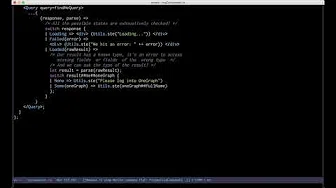Reason-apollo


React-apollo with Reason
Install and setup
Install
yarn add reason-apollo
# Add graphql_ppx
yarn add --dev graphql_ppx
# Add JS dependencies
yarn add react-apollo apollo-client apollo-cache-inmemory apollo-link apollo-link-context apollo-link-error apollo-link-http graphql graphql-tag
bsconfig
Add reason-apollo to your bs-dependencies and
graphql_ppx/ppx to your ppx_flags
bsconfig.json
"bs-dependencies": [
"reason-react",
"reason-apollo"
],
"ppx-flags": [
"graphql_ppx/ppx"
]
send introspection query
This will generate a graphql_schema.json which will be used to safely type your GraphQL queries/mutations.
yarn send-introspection-query http://my-api.example.com/api
Why reason-apollo?
Watch it's usage in this video:

Usage
Create the Apollo Client
Client.re
/* Create an InMemoryCache */
let inMemoryCache = ApolloInMemoryCache.createInMemoryCache(());
/* Create an HTTP Link */
let httpLink =
ApolloLinks.createHttpLink(~uri="http://localhost:3010/graphql", ());
let instance = ReasonApollo.createApolloClient(
~link=httpLink,
~cache=inMemoryCache,
()
);
ApolloProvider
Index.re
/*
Enhance your application with the `ReasonApollo.Provider`
passing it your client instance
*/
ReactDOMRe.renderToElementWithId(
<ReasonApollo.Provider client=Client.instance>
<App />
</ReasonApollo.Provider>
, "index");
Query
MyComponent.re
/* Create a GraphQL Query by using the graphql_ppx */
module GetPokemon = [%graphql {|
query getPokemon($name: String!){
pokemon(name: $name) {
name
}
}
|}];
module GetPokemonQuery = ReasonApollo.CreateQuery(GetPokemon);
let make = (_children) => {
/* ... */,
render: (_) => {
let pokemonQuery = GetPokemon.make(~name="Pikachu", ());
<GetPokemonQuery variables=pokemonQuery##variables>
...(({result}) => {
switch result {
| Loading => <div> (ReasonReact.string("Loading")) </div>
| Error(error) => <div> (ReasonReact.string(error##message)) </div>
| Data(response) => <div> (ReasonReact.string(response##pokemon##name)) </div>
}
})
</GetPokemonQuery>
}
}
Mutation
MyMutation.re
module AddPokemon = [%graphql {|
mutation addPokemon($name: String!) {
addPokemon(name: $name) {
name
}
}
|}];
module AddPokemonMutation = ReasonApollo.CreateMutation(AddPokemon);
let make = (_children) => {
/* ... */,
render: (_) => {
<AddPokemonMutation>
...((
mutation /* Mutation to call */,
_ /* Result of your mutation */
) => {
let newPokemon = AddPokemon.make(~name="Bob", ());
<div>
<button onClick=((_mouseEvent) => {
mutation(
~variables=newPokemon##variables,
~refetchQueries=[|"getAllPokemons"|],
()
) |> ignore;
})>
(ReasonReact.string("Add Pokemon"))
</button>
</div>
})
</AddPokemonMutation>
}
}
ApolloConsumer
If you simply want to have access to the ApolloClient, you can use the ApolloConsumer
<ApolloConsumer>
...((apolloClient) => {
/* We have access to the client! */
})
</ApolloConsumer>
Tips and Tricks
Use @bsRecord on response object
The @bsRecord modifier is an extension of the graphql syntax for BuckleScipt/ReasonML. It allows you to convert a reason object to a reason record and reap the benfits of pattern matching. For example, let's say I have a nested object of options. I would have to do something like this:
switch response##object {
| Some(object) => {
switch object##nestedValue {
| Some(nestedValue) => nestedValue
| None => ""
}
}
| None => ""
}
Kind of funky, huh? Let's modify the response and convert it to a reason record.
type object = {
nestedValue: option(string)
}
module GetObject = [%graphql {|
object @bsRecord {
nestedValue
}
|}
];
This time we can pattern match more precisely.
switch response##object {
| Some({ nestedValue: Some(value) }) => value
| Some({ nestedValue: None }) => ""
| None => ""
}
Use an alias for irregular field names
You might find yourself consuming an API with field names like Field. Currently, reason object field names are required to be camel case. Therefore if you have a request like this:
{
Object {
id
title
}
}
You will attempt to access the response object but it will throw an error:
response##Object /* Does not work :( */
Instead, use an alias to modify the response:
{
object: Object {
id
title
}
}
Then you can access the object like this:
response##object
FAQ
I've added the schema file, but my build fails saying it couldn't be found?
In some cases, it seems like there are some differences between the provided send-introspection-query
and output from tools you might be using to download the schema (such as apollo-codegen or graphql-cli).
If your build is failing, please make sure to try with the provided script. In your project root, run:
$ yarn send-introspection-query <url>





